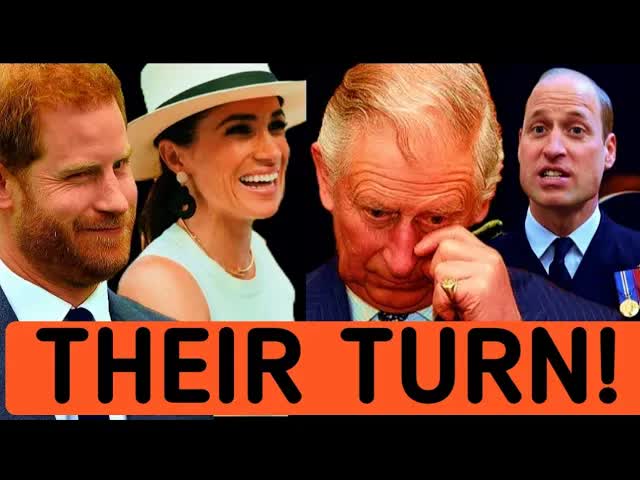In the grand narrative of history, few institutions have wielded as much power and prestige as the royal family.
However, the Windsor clan now stands at a pivotal moment, grappling with the repercussions of their past actions.
The age-old saying, “As you sow, so shall you reap,” rings truer than ever as the public’s perception of the royals shifts dramatically.
Once revered, the monarchy is now subject to intense scrutiny and criticism, revealing a more complex and often unflattering portrait of this storied institution.
The royal family, particularly the Windsors, has found itself under an unprecedented microscope.
Gone are the days when they could rely on blind reverence from the public.
Today’s society is informed, discerning, and less forgiving of missteps.
This change in attitude has been largely fueled by the treatment of Prince Harry and Meghan Markle, whose experiences have sparked widespread outrage and sympathy among the public.
The perceived cruelty and lack of empathy directed towards the Sussexes have not gone unnoticed, forcing many to question the royal family’s integrity.
The turning point in this narrative came with Harry and Meghan’s candid interview with Oprah Winfrey in early 2021.
During this explosive conversation, they shared their struggles with isolation, a lack of support, and even allegations of racism within the palace.
While the revelations shocked many, they also confirmed long-held suspicions about the royal family’s inner workings.
The response from the palace was stark and cold—a brief statement devoid of warmth or understanding—highlighting a troubling double standard in how different family members are treated.
This treatment of Harry and Meghan is emblematic of a deeper issue within the royal family.
It reflects a culture that prioritizes image over humanity and tradition over compassion.
The Sussexes’ ordeal was not just an isolated incident; it exposed systemic flaws within the monarchy.
As the public began to scrutinize the institution more closely, it became clear that the royals were not as untouchable as they had once believed.
Public sentiment, which once firmly supported the monarchy, is now wavering.
The royal family’s reputation, once synonymous with grace and dignity, is increasingly entangled in controversy and scandal.
For generations, the monarchy has been viewed as a bastion of stability, yet recent events have chipped away at that facade, revealing a less-than-ideal reality.
The royal family’s attempts to manage their narrative have only fueled public skepticism.
In an era dominated by social media and instant communication, the public demands transparency and accountability from its leaders.
The royal family, accustomed to a carefully curated image, now finds itself under intense scrutiny.
The changing cultural landscape has left little room for the old ways of operating, and the monarchy’s perceived arrogance is quickly losing its appeal.
Karma, that age-old concept of cause and effect, appears to be at play in the royal family’s current predicament.
Their past actions—marked by coldness and manipulation—have come back to haunt them.
The universe seems to have held up a mirror to the royals, reflecting the very energy they once radiated.
The consequences of their choices are now manifesting in a storm of public judgment that they cannot simply weather.
This storm of karma is not a fleeting moment; it demands change and accountability.
The royal family, once perched at the pinnacle of power, must now confront the reality that their past misdeeds have led them to this point.
They are learning, albeit the hard way, that their titles do not exempt them from the repercussions of their actions.
The very foundation of their influence is being challenged, and they must navigate these turbulent waters carefully.
Looking ahead, the future of the royal family hangs in the balance.
They stand at a crossroads where they can either cling to outdated notions of entitlement or seize this moment for introspection and growth.
Acknowledging their past mistakes and embracing humility could pave the way for reconciliation with the public.
If they choose to foster transparency and inclusivity, they might find that forgiveness is possible.
However, should they remain stubborn and resistant to change, the public’s disillusionment will likely deepen.
The royal family risks becoming increasingly isolated and irrelevant in a world that demands authenticity and accountability.
The path they take in the coming months will be crucial, as they must reckon with the consequences of their actions and the shifting tides of public opinion.
As we watch this unfolding drama, one thing is clear: the royal family is no longer shielded by the mystique of their status.
The world is paying attention, and their actions will undoubtedly shape their legacy.
The question remains—will they rise to the occasion and adapt, or will they become relics of a bygone era?
The answer lies in their willingness to confront their past and embrace a more compassionate future.
